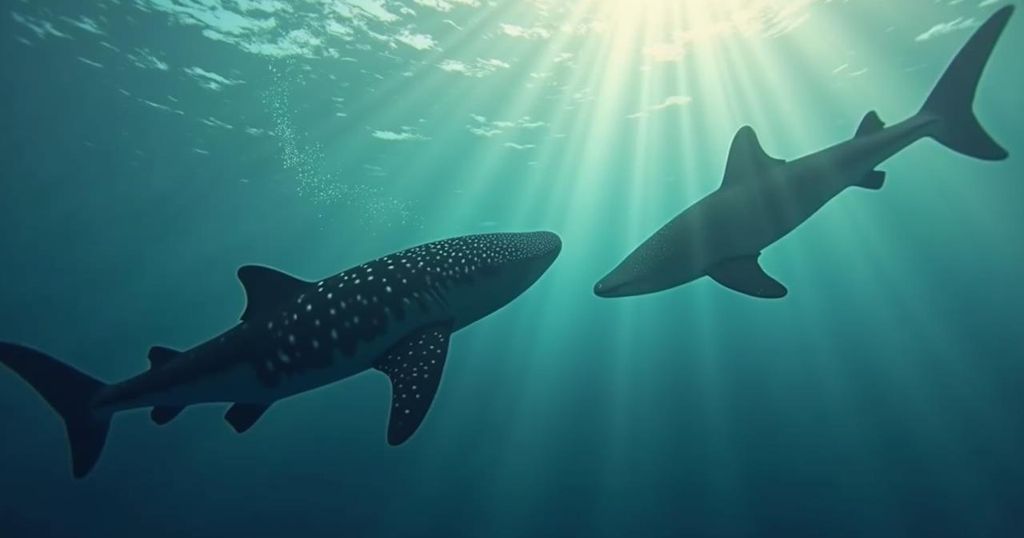A study reveals that global warming could lead to a surge in collisions between whale sharks and large ships, as rising ocean temperatures push these endangered creatures into new habitats that overlap with busy shipping lanes. By the century’s end, the likelihood of such interactions could escalate by 15,000 times. The research advocates for urgent climate change mitigation measures to safeguard whale sharks and their habitats.
A recent study published in Nature Climate Change indicates that the number of whale shark collisions with large vessels may significantly increase as global warming progresses. Researchers from the University of Southampton and the Marine Biological Association have reported that rising ocean temperatures may compel whale sharks, which are already classified as endangered, to migrate into new habitats that intersect with busy maritime shipping lanes. The researchers predict that by the end of the century, the likelihood of ship strikes involving whale sharks could escalate by as much as 15,000 times compared to present-day occurrences. Dr. Freya Womersley, the lead author and a postdoctoral research scientist, indicated that extreme habitat shifts are anticipated under high emissions scenarios. She noted that a global reconfiguration of marine environments could result in significant habitat loss and an increased risk of interactions with shipping traffic. As the largest fish species in the world, whale sharks exhibit high mobility and sensitivity to temperature changes. Recent findings also suggest that they are particularly susceptible to vessel strikes, which can frequently lead to fatal injuries. Utilizing satellite-tracking data of whale sharks alongside global climate models, the team explored the species’ future distribution under three climate scenarios. Under projected high emissions, it is estimated that some regions may see over a 50% reduction in core habitats by the year 2100, predominantly affecting areas in Asia. Conversely, in scenarios aligning with sustainable development and the goal of limiting global temperature rise to no more than 2°C, some areas, particularly in Europe, could see a gain in suitable habitats for whale sharks. Professor David Sims, a co-author of the study, stated that the predicted shifts could be less drastic if climate change is mitigated, reinforcing the notion that proactive measures could alleviate the adverse impacts of climate change on biodiversity. The research team examined the correlation between shifts in whale shark habitats and shipping density to evaluate the risk of ship strikes. Their findings revealed that several newly suitable habitats coincidentally overlap with high shipping traffic routes in regions such as the North Pacific Ocean, Eastern China Seas, and parts of the North Atlantic Ocean, among others. While some areas like the Gulf of Mexico indicated a decrease in risk due to shifts toward less trafficked coastal waters, it was observed that overall, the chances of whale sharks encountering ships might increase under all projected climate scenarios, regardless of current shipping levels. The study underscores the intricate relationship between climate change and marine species management, illustrating how environmental changes may indirectly impose new pressures on vulnerable species such as whale sharks. Dr. Womersley highlighted the necessity of incorporating climate change considerations into strategies for the conservation of endangered species.
Whale sharks are recognized as the largest fish species in the world and are classified as endangered due to various threats, including environmental change and human activities. Global warming has begun to affect marine life and ecosystems, prompting researchers to investigate how rising temperatures influence species distributions. This knowledge is essential for understanding and developing effective conservation strategies for species impacted by climate change, particularly those vulnerable to anthropogenic pressures, such as shipping traffic.
In conclusion, the study emphasizes a crucial link between climate change and the rising risk of whale shark collisions with large vessels, highlighting the potential for a dramatic increase in interactions as ocean temperatures continue to rise. The projected alterations in whale shark habitats necessitate urgent action to mitigate climate-related impacts and enhance conservation efforts for this endangered species. Proactive strategies could contribute to reducing habitat loss and minimizing the risk of ship strikes, thus protecting whale sharks in rapidly changing marine environments.
Original Source: www.eurasiareview.com







